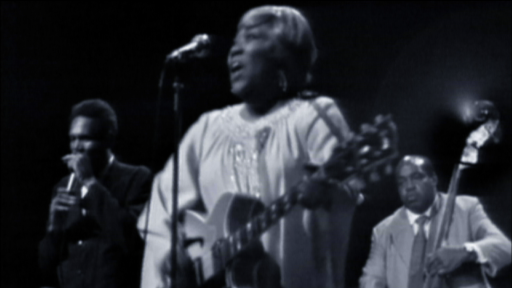Check out our playlist inspired by American Masters – Buffy Sainte-Marie: Carry It On and learn more about the songs that have defined Sainte-Marie’s life and career.
It’s My Way
“It’s My Way” is the title track on Buffy Sainte-Marie’s first album, released in 1964. The cover of the album depicts Sainte-Marie with a mouth bow. A staple of Sainte-Marie’s early style, the mouth bow is said to be one of the oldest stringed instruments – the earliest known depictions of it are about 15,000 years old. The mouth bow can be found in many Indigenous cultures around the world.
Universal Soldier
Written at the onset of the Vietnam War, “Universal Soldier” is Sainte-Marie’s answer to the question “Who’s responsible for war?” It focuses on our individual complicity. The song became a hugely successful anti-war anthem after being covered by the folk singer, Donovan, who is often incorrectly credited as its writer.
Cod’ine
“Cod’ine” is the harrowing story of living with an opioid addiction. While traveling in her 20s, Sainte-Marie contracted a bronchial infection and was unwittingly prescribed high doses of codeine – leading her into a crippling addiction. At the time, opioids like codeine were widely prescribed and even available over the counter in Canada. Released in 1964, Sainte-Marie’s criticism of the over-prescription of opioids came over 50 years before the opioid crisis was officially deemed a public health emergency in the United States.
Bury My Heart at Wounded Knee
Initially released in 1991, “Bury My Heart at Wounded Knee” is another of Sainte-Marie’s protest songs illuminating the various atrocities committed towards the Native American community. In it, she specifically refers to the 1973 occupation of Wounded Knee, South Dakota by members of the American Indian Movement that ended in bloodshed.
Until It’s Time for You to Go
Considered by some to be a feminist anthem, “Until It’s Time for You to Go” was written by Sainte-Marie in 1965. From the woman’s perspective, the song describes a relationship between an ordinary man and woman who, despite their love for one another, have to acknowledge that their relationship must end. “Until It’s Time for You to Go” became one of Sainte-Marie’s most popular songs and has been covered by other artists over 150 times – nine of those recordings were by Elvis Presley.
Disinformation
After taking a break from the music industry for 16 years, Buffy Sainte-Marie made a triumphant comeback with her album “Coincidence and Likely Stories” released in 1992. In it, she addresses the many trials and tribulations she’d gone through in her career including being blacklisted by the United States government in the 1970s. In a campaign to suppress the activities of what was deemed The New Left, FBI Director J. Edgar Hoover had memos sent to radio stations encouraging them to stop playing Sainte-Marie’s music. “Disinformation” is Buffy’s response to that suppression.
Up Where We Belong
When Jack Nitzsche became stumped while scoring the film “An Officer and a Gentleman,” he turned to Buffy Sainte-Marie for help. She played him the melody for her song “Up Where We Belong,” which took on “a life of its own.” The iconic song eventually went on to win several major awards, including the award for Best Original Song at the 55th Academy Awards in 1983.
Power in the Blood
“Power in the Blood” is the title track from Sainte-Marie’s 2015 album. Both the song and the album lean into Buffy’s pioneering work in electronic music. In 2015, she beat Drake for the Polaris Music Prize with this album.
Carry It On
“Carry It On” is a rousing anthem for artists and activists, and the namesake of American Masters – Buffy Sainte-Marie: Carry It On. Sainte-Marie herself described the song’s message by saying, “Humans are vulnerable, governments come and go, and nature is sacred, so take care of your link with life and thrive.”




















